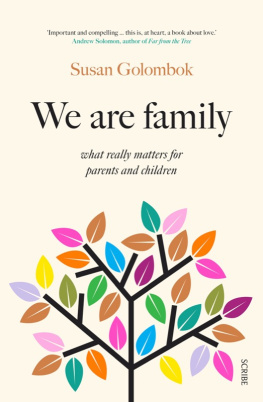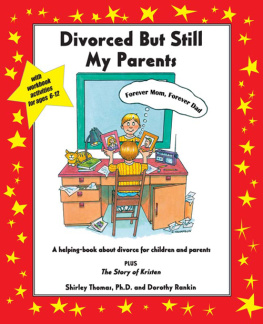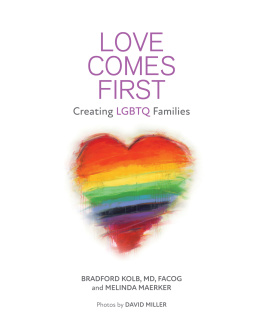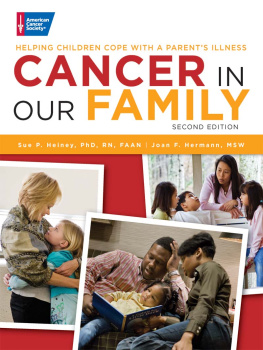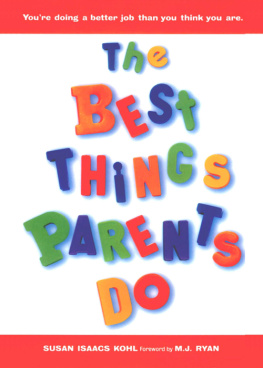Some names and biographical details have been changed to protect individuals privacy.
Copyright 2020 by Susan Golombok
Cover design by Pete Garceau
Cover copyright 2020 by Hachette Book Group, Inc.
Hachette Book Group supports the right to free expression and the value of copyright. The purpose of copyright is to encourage writers and artists to produce the creative works that enrich our culture.
The scanning, uploading, and distribution of this book without permission is a theft of the authors intellectual property. If you would like permission to use material from the book (other than for review purposes), please contact permissions@hbgusa.com. Thank you for your support of the authors rights.
PublicAffairs
Hachette Book Group
1290 Avenue of the Americas, New York, NY 10104
www.publicaffairsbooks.com
@Public_Affairs
Originally published in 2020 by Scribe
First US Edition: October 2020
Published by PublicAffairs, an imprint of Perseus Books, LLC, a subsidiary of Hachette Book Group, Inc. The PublicAffairs name and logo is a trademark of the Hachette Book Group.
The Hachette Speakers Bureau provides a wide range of authors for speaking events. To find out more, go to www.hachettespeakersbureau.com or call (866) 376-6591.
The publisher is not responsible for websites (or their content) that are not owned by the publisher.
Eighty-six (86) words from The Bastard of Istanbul by Elif Shafak (Penguin Books 2008, 2019) Copyright Elif Shafak, 2007
Excerpt from WE ARE FAMILY, Words and Music by Bernard Edwards and Nile Rodgers 1979 Bernards Other Music (BMI). All rights on behalf of Bernards Other Music administered by Warner-Tamerlane Publishing Corp. Reproduced by permission of Sony Music Publishing, London W1F 9LD
Susan Golombok, Research on Assisted Reproduction Families: A Historical Perspective, ed. Gabor Kovacs, Peter Brinsden, & Alan DeCherney, In-Vitro Fertilization: the pioneers history, 2018, Cambridge University Press 2018, reprinted with permission
Susan Golombok, Modern Families: parents and children in new family forms, 2015, Susan Golombok 2015, published by Cambridge University Press, reprinted with permission
Excerpt from Red Dust Road by Jackie Kay Jackie Kay 2010, reproduced with permission of the Licensor through PLSclear
Typeset in Fournier MT by Scribe
Library of Congress Control Number: 2020940094
ISBNs: 978-1-5417-5864-3 (hardcover), 978-1-5417-5863-6 (ebook)
E3-20200827-JV-NF-ORI
To John and Jamie, my family
When you have absolutely no idea what kind of man your father is, your imagination fills in the void. Perhaps I watch him on TV or hear his voice on the radio every day, without knowing its him. Or I might have come face-to-face with him sometime, someplace. I imagine I might have taken the same bus with him; perhaps he is the professor I talk to after class, the photographer whose exhibition I go to see, or this street vendor here You never know.
ELIF SHAFAK, THE BASTARD OF ISTANBUL, 2007.
What is the family? Time was when most people probably thought the answer was not merely clear but obvious. Today it is more complex Children live in households where their parents may be married or unmarried. They may be brought up by a single parent, by two parents or even by three parents. Their parents may or may not be their natural parents Some children are brought up by two parents of the same sex. Some children are conceived by artificial donor insemination. Some are the result of surrogacy arrangements. The fact is that many adults and children, whether through choice or circumstance, live in families more or less removed from what, until comparatively recently, would have been recognised as the typical nuclear family. This, I stress, is not merely the reality; it is, I believe, a reality which we should welcome and applaud.
SIR JAMES MUNBY, FORMER PRESIDENT OF THE FAMILY DIVISION OF THE HIGH COURT AND HEAD OF FAMILY JUSTICE FOR ENGLAND AND WALES, 2018.
We are family
I got all my sisters with me
We are family
Get up everybody and sing
SISTER SLEDGE
It began by chance with a copy of the feminist magazine Spare Rib, delivered to my doorstep in Camden, London in September 1976. Recently arrived from my native Scotland, I was beginning a Masters degree in child development at the University of London, and the magazines cover story caught my eye. It showed a photograph of three women and their three children underneath the headline, Out of the closet into the courts: why could one of these women lose custody of her child? I flipped open the magazine and began to read.
The journalist, Eleanor Stephens, described how, almost without exception, lesbian mothers fighting custody battles against their former husbands were losing the right to live with their children, in stark contrast to the experiences of heterosexual mothers who were practically always awarded custody in those days. At the time the article was published, not a single lesbian woman had been awarded custody of her children by a UK court. There was no actual evidence that lesbian women were poor parents, and yet they were being separated from their children on the grounds that it was against a childs best interests to be raised in a lesbian household. This immediately struck me as unjust andwhats moreunscientific.
The article called for a volunteer to carry out an objective study into the wellbeing of children in lesbian mother families, something that had never been done before. I had been searching for a subject for my Masters dissertation, and felt that it was cruel to break up these families, especially in the absence of any evidence against them. So I responded to the call for help, offering my services as a fledgling researcher. Little did I know that this would be the start of a research project that would continue for the rest of my working life.
I got in touch with Action for Lesbian Parents, the group of women mentioned in the article who were dedicated to publicising the unfairness of the legal system and were looking for researchers to investigate children growing up in lesbian mother families. A woman called Berni Humphreys answered my call and invited me to come to her home in Cambridge where the group was based. Bernis house was a large, grey-stoned Victorian villa, with childrens drawings on the walls inside. I was nervous throughout the meeting. The women in the group were all mothers, which seemed terribly grown-up to my 22-year-old self, and some were involved in fierce child custody disputes with their ex-husbands. They understandably wanted to make sure that I could be trusted to carry out an independent study, and were especially concerned that I did not hold preconceived ideas about lesbian mother families. They asked me about my background and questioned me in great detail about how I would conduct the research. Some of the women were researchers themselves and gave me a tough grilling. But somehow, I passed their test, and they agreed to put me in touch with organisations that could help me find families who were willing to take part.
Many years later, I moved to Cambridge to become the director of the Universitys Centre for Family Research. Whenever I pass that grey-stone house I think of the drawings on the walls and wonder where those children are today. I also think about how the families in that housewho had to fight so hard for their existence, let alone acceptancepaved the way for many different types of families, families I could not even imagine in 1976.


